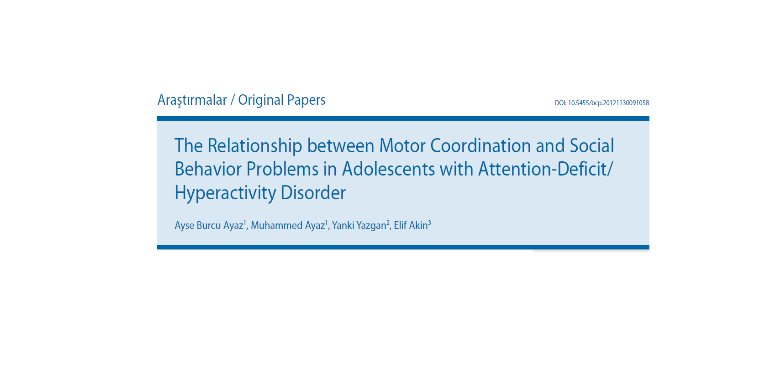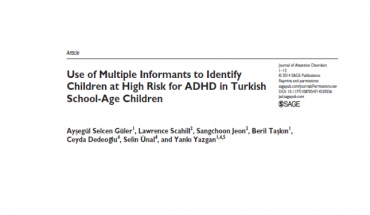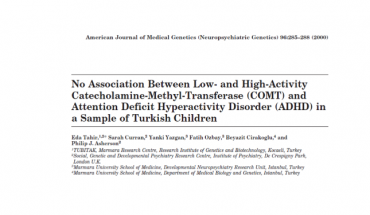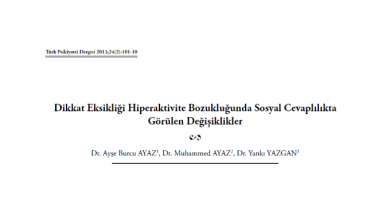The relationship between motor coordination and social behavior problems in adolescents with Attention-Deficit/ Hyperactivity Disorder
ABSTRACT:
Objective: Attention-deficit/hyperactivity disorder (ADHD) is one of the most common neurodevelopmental childhood disorders and 30-50% of individuals with ADHD are reported to also have a co-morbid motor coordination problem. This study aimed to examine motor coordination skills, and the correlation between motor coordination problems and social problems in children with ADHD.
Method: In our study, the ADHD group was composed of 64 children between 12-15 years that were diagnosed with ADHD. The control group included 69 children in a similar age and sex range to the ADHD group. The Purdue Pegboard Test (PPT), the Child Behavior Checklist and the Kiddie Schedule for Affective Disorders and Schizophrenia were used in the assessment of children. IQ was assessed using the Wechsler Intelligence Scale for Children-Revised.
Results: More children in the ADHD group had motor coordination problems than in the control group and social problems were correlated with motor skills in the ADHD group. While the girls in the control group had better motor skills than the boys, there were no significant differences between genders in the ADHD group. More girls in the ADHD group had motor coordination problems than in the control group, according to the PPT dominant hand, non-dominant hand, and assembly subtest scores whereas there was no significant difference in any of the PPT subtest scores between the boys in both groups. Age was associated only with PPT bimanual subtest scores in ADHD group.
Conclusions: The present results show that there is a relationship between motor coordination problems and social problems in an ADHD group. It is also suggested that the impairment of girls with ADHD and comorbid motor coordination problems should not be underestimated.
Key words: Attention deficit hyperactivity disorder, motor skills, social problems
Bulletin of Clinical Psychopharmacology 2013;23(1):33-41
ÖZET:
Dikkat Eksikliği Hiperaktivite Bozukluğu tanısı konulan ergenlerde motor koordinasyon ve sosyal davranış sorunlarının ilişkisi
Amaç: Dikkat eksikliği hiperaktivite bozukluğu (DEHB) en sık görülen çocukluk çağı nörogelişimsel bozukluklarından birisidir ve DEHB tanısı konulan bireylerin %30-50’sinin aynı zamanda eşlik eden motor koordinasyon sorunları olduğu bildirilmektedir. Bu çalışma DEHB tanısı konulan çocuklarda motor koordinasyon becerilerini ve motor koordinasyon sorunlarının sosyal sorunlarla ilişkisini incelemeyi amaçlamıştır.
Yöntem: Çalışmamızda vaka grubunu DEHB tanısı konulan 12-15 yaş arası 64 çocuk oluşturdu. Kontrol grubu vaka grubu ile benzer yaş ve cinsiyet aralığında bulunan 69 çocuktan meydana gelmekteydi. Çocukların değerlendirilmesinde, Çivili Tahta El Beceri Testi (ÇTEBT), Çocukluk Çağı Davranış Değerlendirme Ölçeği ve Okul Çağı Çocukları İçin Duygulanım Bozuklukları ve Şizofreni Görüşme Çizelgesi kullanıldı.Zeka düzeyi, Wechsler Çocuklar için Zeka Ölçeği kullanılarak değerlendirildi.
Bulgular: DEHB grubunda kontrol grubuna oranla daha çok sayıda çocuk motor koordinasyon sorunu yaşamaktaydı ve DEHB grubunda sosyal sorunlar motor becerilerle ilişkiliydi. Kontrol grubunda, kızların erkeklere oranla motor becerileri daha iyi olmasına rağmen, DEHB grubunda cinsiyetler arasında anlamlı bir fark bulunmadı. DEHB grubunda kontrol grubuna oranla ÇTEBTbaskın el, baskın olmayan el ve bileşik oturum alt test puanlarına göre daha fazla sayıda kız çocuğunun motor koordinasyon sorunu vardı, buna rağmen her iki gruptaki erkek çocuklar arasında ÇTEBT’nin hiçbir alt testinde anlamlı bir fark saptanmadı. DEHB grubunda ÇTEBT’desadece her iki elin kullanıldığı alt testler yaş ile ilişkiliydi.
Sonuçlar: Sonuçlarımız DEHB grubunda motor koordinasyon sorunları ile sosyal sorunlar arasında ilişkili olduğunu göstermektedir. DEHB tanısı konulan kız çocuklarındaki yetersizliklerin ve eşlik eden motor koordinasyon sorunlarının gözardı edilmemesi gerektiği düşünülmektedir.
Anahtar sözcükler: Dikkat eksikliği hiperaktivite bozukluğu, motor beceriler, sosyal sorunlar
KlinikPsikofarmakoloji Bülteni 2013;23(1):33-41
1-M.D., Sakarya University Research and Trainig Hospital, Child and Adolescent Psychiatry Outpatient Clinic, Sakarya – Turkey
2-Prof., Guzel Gunler Children’s Health Center, Istanbul – Turkey
3-M.D., Elazig Mental Health Hospital Child and Adolescent Outpatient Clinic, Elazığ – Turkey




